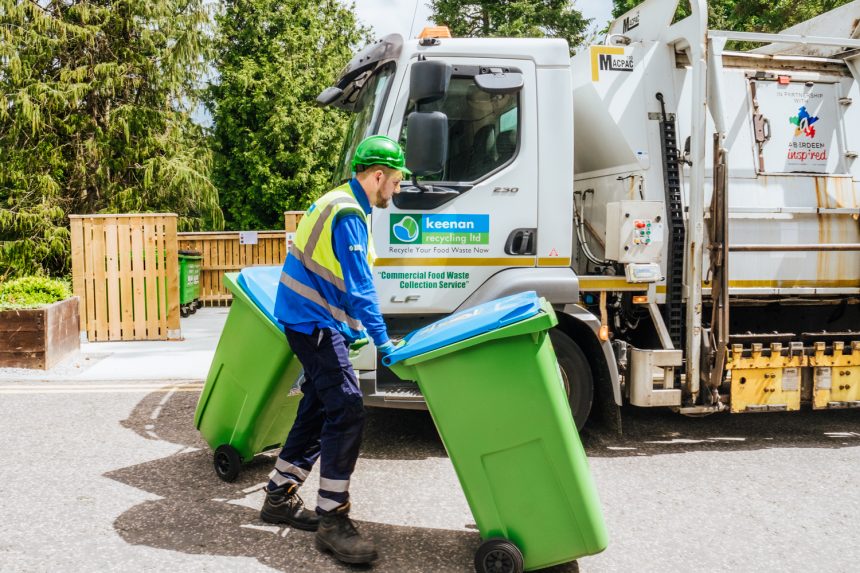The United Kingdom is renowned for its stringent and highly effective garbage classification system. However, the regulations can be perplexingly intricate, with each city implementing different guidelines for waste sorting, including separate rules within London’s boroughs. International students arriving in the UK may encounter difficulties accurately discerning the various colours of roadside bins. If you are confused about garbage classification, it would be beneficial to consult this comprehensive guide on waste management and recycling practices in the UK.
Core Changes of UK Waste Collection Policy
| Policy/Trend | Change Details | Influence |
|---|---|---|
| Landfill tax | Rised to £126 per ton in April 2025. | It has significantly increased the cost of waste treatment, prompting enterprises and local governments to seek alternative solutions. |
| Industry digitalization | Starting from 2026, all waste transportation must be recorded online. | Waste transporters and enterprises need to adopt digital tracking systems as soon as possible. |
| Resources and Waste strategy | Promote the transformation to a circular economy. | Emphasize minimizing waste and promoting resource efficiency to the greatest extent. |
The sharp increase in Landfill Tax
The British government is striving to vigorously promote the transformation of the waste management industry through economic levers. Since April 2025, the landfill tax in the UK has been significantly raised to £126 per ton. Compared with the moderate compound annual growth rate (CAGR) of 2.6% each year from 2015 to 2024, this 22% annual increase indicates the government’s decision and marks a sharp “turning point”. This tax has affected the operating costs of waste management companies and also accelerated investment and exploration in recycling, waste minimization and resource efficiency.
Digital Transformation of Waste Management in the UK
Another major industry change is the digitalization of waste transportation. From 2026, the waste industry in the UK will fully move towards digitalization, requiring that every waste transportation activity be recorded online. This reform is mandatory and offers no alternative options to waste transporters and waste-generating enterprises. This transformation aims to enhance the transparency and efficiency of waste tracking and ensure environmental compliance.
What Are The Different Types of Waste in the UK?
The waste in the UK is typically categorized into three main types: food waste, general waste, and recyclable waste, each with its own sub-categories. It should be noted that regulations may vary across different regions, resulting in variations in recycling practices regarding timing and frequency.
Food Waste
In some areas, residents receive a unique food waste bag (also called a liner or kitchen caddy). You can put any raw, cooked or expired food into it. But before putting it in the recycling bin, be sure to remove the packaging materials, especially plastic ones. For packaging materials such as milk cartons or canned food, be sure to pour out the food inside and rinse it before putting it in the recycling bin. In addition, do not pour any liquid into the container to avoid leaks and other troubles. If you do not have recycling bins in your area, you should put food waste into the non-recyclable trash bin.

Plastic Waste
Free Clear Recycling Sacks are available in some communities for recycling plastic bottles, spray bottles, lotion bottles, beverage bottles, milk bottles, etc. But they do not include caps, plastic film, Saran Wrap, plastic bags, plastic food trays, and plastic toys and yoghurt containers. Also, be sure to empty and clean the liquid out of the bottle before recycling. You can leave the outer packaging and compress the bottle to save space.

Electrical Waste
Small appliances such as electric kettles, hairdryers, electric toothbrushes, irons, alarm clocks, electric toys, mobile phones and desk lamps are usually recycled in two ways. One is to throw the waste directly into the Pink Recycling Bank on the street, but some areas require residents to place their old appliances next to the trash can for more straightforward disposal. If the appliances are still working, you can also choose to donate them to a local charity organization or sell them on a second-hand website.
Cloth Waste
Unwanted clothing can be put in a donation box (also known as a clothing bank). Items such as sheets, bedding, pillows, cushions, curtains and shoes can also be put in the box. Donation boxes are usually found in parking lots and accommodation areas, or you can search online to find one near you.
Battery Waste
Battery stores and supermarkets usually have particular battery bins for recycling batteries for household appliances and watches. Discarded batteries should not be discarded in ordinary garbage cans because they contain a large number of heavy metals and toxic chemical waste, and arbitrary treatment will lead to serious soil and water pollution.

Large Waste Items
When dealing with large items such as washing machines, televisions, refrigerators and furniture, you can contact the manufacturer, who will provide a paid recycling service. You can also take these items to a local recycling centre or make an appointment for a home pickup, advising checking the nearest recycling point. In addition, you can contact a local charity organization to have them picked up.
Large Waste Items
Medicines that are no longer needed should be returned to the pharmacy for recycling. Do not discard them. Plastic containers and packaging can be put in the trash or recycled.
Other Waste
These are the most common types of recycling in the UK. If you need help with how to recycle a particular item, visit Recycle Now for guidance.
Summary of the UK's Waste Classification
In the UK, waste is generally divided into domestic waste, recyclable waste, construction waste, waste furniture, electrical appliances, batteries, etc.
- Domestic waste includes non-recyclable waste, such as kitchen food and fruit peels.
- Recycling waste is more specific, including glass bottles, plastic bottles, cans, waste newspapers, etc.
- Construction waste mainly includes waste generated from house construction, such as wood, bricks, soil, etc., as well as garden waste, including lawn mowing, soil, branches, waste fences, etc.
- Used furniture includes sofas, cabinets, tables, benches, etc.
- Electrical appliances refer to large electronic products such as TVs, refrigerators, washing machines, etc.
- There are particular recycling bins for waste batteries.
Find out Different City's Waste Recycling Regulations
Enter your postcode into GOV.UK to find out which Council you belong to. Then, search for Waste and Recycling on the city website to find out what your city’s recycling rates and times are.
Common Waste Bins in The UK

The common garbage bins in the UK are green, blue and brown, each with different recycling functions. The specific differences are as follows:
Green Rubbish Bins
Green bins can be used for all kinds of food waste, such as bread, cakes, cooked food, raw meat (including bones), leftovers, flowers, plants, fruits, branches and leaves, tea bags and coffee, etc.
Blue Rubbish Bins
Green trash cans can be used to discard paper waste, including but not limited to magazines, newspapers, leaflets, advertising papers, cardboard, cartons, envelopes, cards and other types of wrapping paper.
Black Rubbish Bins
Black bins can be used for discarding glass bottles, cans, food cans or bottles (excluding lids), spray cans, tin foil, take-out trays, aluminum foil (as packaging material), etc.
Because regulations vary from place to place, the same coloured bins may be used for different types of waste. For example, green bins are for garden waste in Liverpool, but in Warwick, green bins are for general food waste.
Waste Packaging Rules in UK
In the UK, in addition to having specific rules for sorting waste, there are also specific requirements for packaging waste. Recycling materials should be put into a recycling sack provided by the government, while non-recycling waste should be put into a rubbish bag.
Recycling Sack
Recycling Sack is suitable for paper, cardboard, food cans, drink cans, glass bottles, glass jars, cartons, plastic bottles (remove the cap), plastic basins, plastic trays, spray containers (empty), and cleaned and pressed aluminium foil. This waste should not be packed in ordinary garbage bags, as it will be rejected if found with non-recyclable waste.
Rubbish Bag
Handbags, black bags, Styrofoam packaging, glass beads, foam packaging, plastic wrap, Saran Wrap, snack packaging, candy wrappers, take-out coffee cups, coffee machine capsules, coffee beans, wet tissues, tissues, paper towels (kitchen, bathroom), broken glassware, Pyrex plates, broken windows (wrapped in newspaper) and mirror glass (wrapped in newspaper) are non-recyclable. They should be put in the Rubbish Bag.
Waste Collection Time in the UK
- In the UK, there are fixed bin collection times for waste in each community, and different types of waste are collected at different times. Therefore, on Sunday evenings, you can see various bins with their respective categories outside your door. If you don’t have a bin, you need to attach a color-coded label to your waste bag.
- Street bins are labelled with house numbers, and bins that are not correctly sorted will be refused by the garbage truck. In addition to mis-sorting, you could also face fines from local authorities for overfilling your bin or leaving rubbish on the street. Penalties for refuse sorting in the UK can be as high as £2,500 in serious cases.

Tips for Waste Recycle in UK
Low frequency
Bin collection in the UK is relatively infrequent, taking place once a week in some areas and even twice a week in others, and only certain types of waste are collected at each time. Therefore, if you miss this time period, you have to wait for another week.
Strict regulations
The attitude of British sanitation workers is unyielding. If you do not classify the garbage according to the regulations, they will probably refuse to accept it directly. Therefore, when sorting and recycling waste in the UK, we need to try to do the following:
- Place the garbage in the designated area in advance
- The garbage can not overflow the garbage can
- The lid of the garbage can must be covered
- Sort your waste properly
If you’re thinking about studying in the UK, it’s crucial to find the right student accommodation. That’s where uhomes.com comes in. It’s a reliable platform that helps students like you find the perfect place to live in London, Manchester, Glasgow, Cardiff, Birmingham and many other cities. So far, they’ve helped more than 55,000 students successfully find their dream homes.

FAQ
The recyclable waste in the UK includes paper, cardboard, glass bottles and jars, metal cans and tins, and specific types of plastic such as beverage and detergent containers. The local council also promotes composting for the recycling of food and garden waste.
Households and businesses can benefit from the services provided by their local council, which typically encompass regular rubbish collection, recycling schemes, and hazardous waste disposal. When it comes to more oversized items, arranging a visit to the nearest recycling centre or scheduling a particular collection is recommended. Collaborating with a qualified waste removal company becomes crucial for larger or commercial disposal requirements, ensuring that the waste is managed in compliance with environmental regulations.
The waste collection legislation in the UK is governed by the Environmental Protection Act 1990, which mandates local authorities to collect and manage waste in a manner that minimizes its environmental impact. This law prioritizes waste prevention, reuse, recycling, and energy recovery.
The system employs three distinctively coloured bins: one designated for general waste, another allocated for recyclable materials, and a third specifically intended for organic or green waste. By implementing source separation of waste, the promotion of valuable material recycling is facilitated.
If you are interested in more UK living tips. Please check following blogs!










